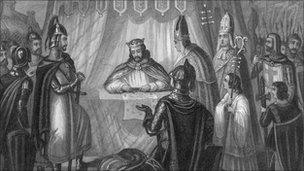Magna Carta 800th anniversary celebrations begin
- Published
Adrian Yalland from the Magna Carta Trust explains why the document is so important
Five years of celebrations leading up to the 800th anniversary of the Magna Carta have been publicly launched.
Lord Chancellor Ken Clarke was among the dignitaries at a memorial site in Runnymede, Surrey, where King John sealed the charter of rights in 1215.
Mr Clarke spoke of the enduring principles of justice and freedom from oppression.
Exhibitions of the Magna Carta are planned, and there is also a call for 15 June 2015 to be a public holiday.
Mr Clarke, who is also justice secretary, used the occasion to underscore the coalition's ambition to restore the power of individuals against the state.
He said all states had "a natural tendency to accumulate more power than they need and to impose more restrictions than are strictly and sensibly necessary".
Commemorative stamp
As part of the anniversary celebrations, exhibitions of the Magna Carta are planned in the UK and Commonwealth.
The Magna Carta Trust is also campaigning for a public holiday on 15 June 2015 - the exact anniversary - and are asking the Royal Mint to issue a commemorative coin in the same year.
Talks are also under way for a commemorative stamp.
An exhibition is expected to be held at the British Library in London, with smaller events planned for schools and libraries across the UK.
Some 160 British Council offices around the world are also considering producing displays.
The trust is aiming to make people more aware of the legal, political and constitutional importance of the document, which has World Heritage status.
The original set of rulings, stemming from a row between King John and English barons, still has some resonance in modern-day English law - it helped clarify the right of trial by jury, for example.
The document also has relevance further afield. It was much studied in the US prior to that nation's fight for independence from Britain.

Rulings in the charter from 1215 still resonate
Master of the Rolls, Lord Neuberger, chairman of the Magna Carta Trust and the country's second most senior judge, said the charter's importance should not be understated.
"Enshrining such noble concepts as freedom under law, democracy and the importance of limited government, it was a pre-cursor to many of the freedoms and liberties that humanity rightly expects their governments to respect today," he said.
The anniversary launch at the Runnymede site, where barons gathered to petition King John for the first Great Charter, was attended by representatives from the "charter towns" - Runnymede, Canterbury, City of London, St Albans and Bury St Edmunds.
The charter towns are five places associated with the granting of the Magna Carta, and which take turns to host celebrations every three years.
There were also people from Lincoln and Salisbury, the cathedrals of which each house an original copy of the Magna Carta.
- Published2 September 2010